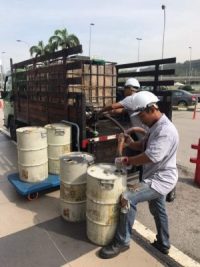November 8, 2017
FatHopes Energy, based in Selangor, Malaysia is changing the recycling of biowastes throughout the region. By introducing new technology to answer the specific needs of fast food restaurants, they have increased their network of used cooking oil collection to cover 18,000 restaurants[1] in Malaysia, Singapore, Thailand and Indonesia.
But anyone can sell used oil from a restaurant and it has been going on for years in the area. So what makes the FatHopes Energy solution different? To answer this question we must look at the social aspects of vegetable oil purchase and use in the region. It is common for used cooking oil to find its way back into virgin cooking oil, without the knowledge of customers, via unauthorised and undocumented routes. Companies, including international brands like McDonald’s, want to make sure that their used cooking oil is converted to biofuel and does not end up back in the food chain. ISCC certification, coupled with new technology from FatHopes Energy, offers a solution that is easy to implement and cost effective. According to FatHopes many more restaurants, from small ones to big chains, are getting involved.
FatHopes Energy was an early follower of the ISCC Standard, gaining certification in 2014, to convince suppliers and customers that they had a stable and transparent supply chain. Vinesh Sinha, the Founder and Managing Director of the company says, “ISCC certification proves to my suppliers that their used cooking oil is transformed into sustainable biofuel that they can use in their machinery or delivery trucks. ISCC traceability requirements ensure that the used cooking oil never enters the food chain, giving peace of mind from day one.” About a third of the used oil collected is transformed into biodiesel by the company and returned to local restaurants for use in transport, or sold on the open market. The rest is exported, and converted to regular biodiesel in Europe or treated to form HVO (hydrogenated vegetable oil) biodiesel. ISCC certification means that both types of biodiesel are immediately compliant with European requirements.
The new technology provided by the company centres on Internet enabled level sensing in ‘smart’, space saving, lockable metal tanks. The tanks are connected directly to the fryers via a pump and valve arrangement. Hot cooking oil can be evacuated at the flick of a switch when needed. The volume of oil in the tanks is continuously monitored and information uploaded to the company accounting system. Information on usage and inventories is immediately available for auditors and managers. FatHopes Energy says that this technology ensures that ISCC certification is more straightforward and that no unauthorised losses of used cooking oil occur.
FatHopes Energy provides all the technology in return for a long-term contract for supply of used cooling oil, making it accessible even for small restaurants, which do not need to outlay capital. Vinesh again “restaurants find that they need less fryers when we have installed our system, as they don’t need to wait for the cooking oil to cool before emptying it into the waste tank. So they can have more retail space which generates more income.” The technology enables restaurants both to operate efficiently and to maximise returns from their investment.

The company is also applying its forward thinking to other biowastes. They collect trap grease from restaurants, palm oil wastes directly from the mills and inedible cashew nut oil. To facilitate the trading and reuse of these materials, they are investing in a tank terminal and infrastructure at Port Klang in Malaysia. This facility is strategically located to be a regional consolidation and purification hub and it is available for use by other businesses, which allows them to grow too, creating jobs for local people. The company is constantly looking for new sources of biowastes, putting into practice its motto; ‘Waste to Wealth Conversion’.
If you would like to learn more about how you can apply ISCC certification for the collection of UCO or any other sector please do not hesitate to contact the ISCC help desk and write an email to info@iscc-system.org!
Click here to download the full article
[1] According to company information